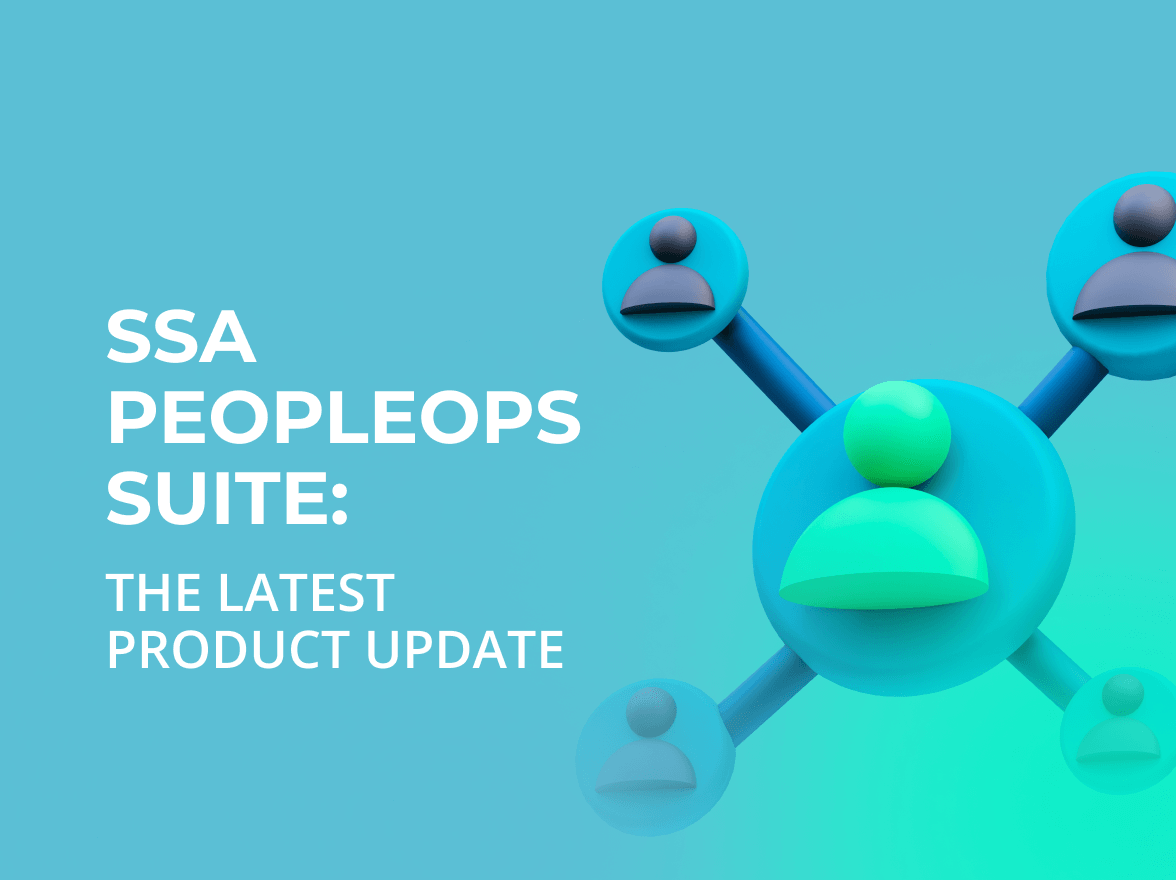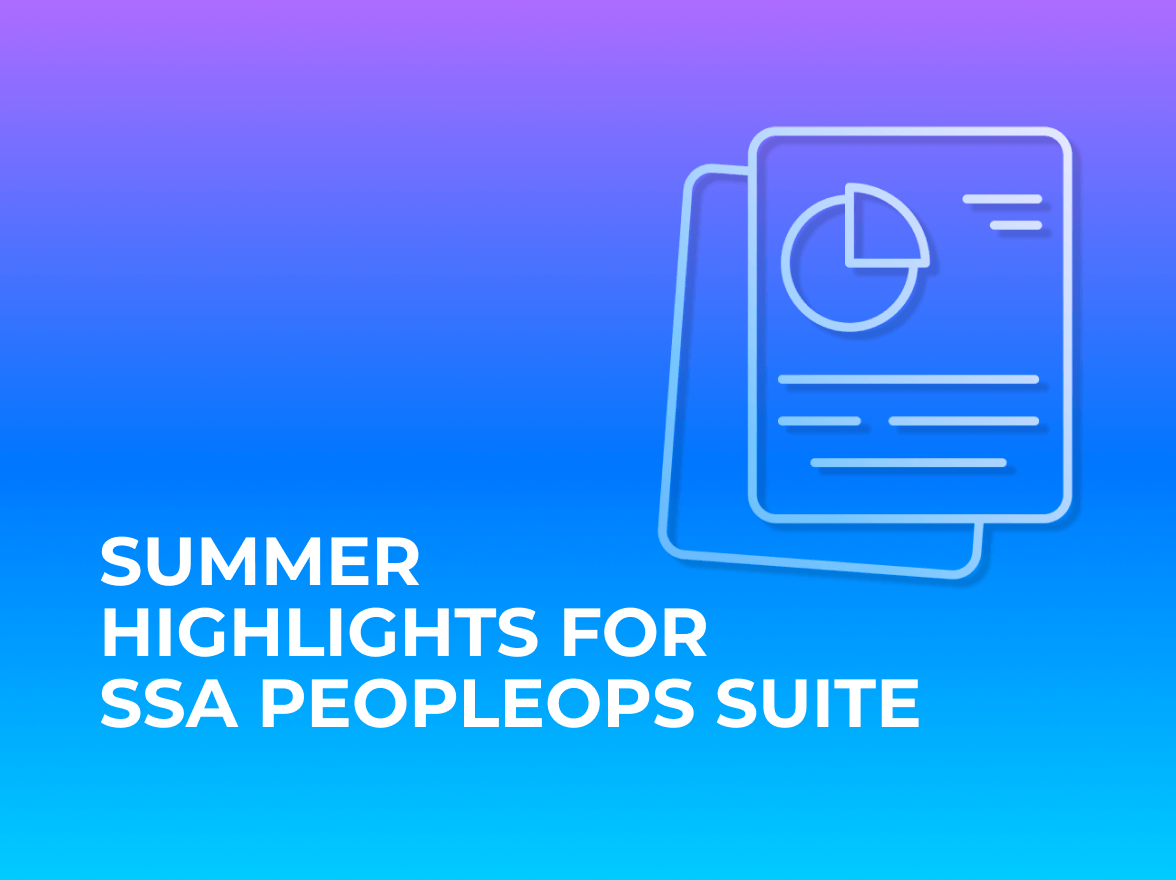SSA PeopleOps Suite: The latest product update
It’s been a while since our last SSA PeopleOps Suite update — not because the team was on vacation, but because we’ve been working intensively on meaningful improvements.
In today’s hyper-connected, digitally driven world, the role of Human Resources has evolved beyond managing payroll and hiring employees. With the emergence of advanced HR system software, businesses are embracing a smarter, more integrated approach to people management. These intelligent platforms are not just streamlining HR operations but are significantly improving productivity across every department.
SSA Group, a leader in digital innovation and software development, is at the forefront of this transformation. Through products like the PeopleOps Suite, they are helping businesses make a digital quantum leap—empowering organizations to recruit, manage, and support talent with efficiency like never before.
Let’s dive deep into how smart HR systems are optimizing departmental performance, fueling productivity, and contributing to better business outcomes.
Traditionally, HR departments were largely administrative, dealing with employee records, benefits, and compliance paperwork. But as businesses scaled and digital transformation became a necessity, the limitations of manual or semi-automated HR processes started to hinder operational efficiency.
This is where modern HR system software shines. It automates tedious tasks, facilitates employee engagement, and acts as a strategic partner to every department. More importantly, smart HR platforms centralize operations, allowing data to flow across departments—from Finance to Operations and Marketing—eliminating silos.
By replacing legacy systems with integrated solutions like SSA Group’s PeopleOps Suite, HR departments are now empowered to contribute directly to organizational goals, helping businesses align their workforce strategy with growth objectives.
Hiring the right talent is a shared interest among all departments. Whether it’s marketing needing a content strategist or IT scouting for a cybersecurity analyst, the hiring process must be efficient, targeted, and seamless.
Modern HR system software enhances recruitment by enabling:
For example, an HR manager can create department-specific onboarding journeys, ensuring that an engineer receives the tools and resources relevant to their role while a sales executive gets their CRM access and sales scripts right on day one.
One of the most underrated benefits of smart HR system software is its ability to unify communication channels within a company. Miscommunication and lack of visibility between departments often lead to bottlenecks, duplicated efforts, and missed deadlines.
HR platforms today are equipped with:
By offering transparency into team goals and performance metrics, HR systems encourage interdepartmental accountability. For instance, a project manager in Product Development can easily track the hiring progress for new developers or view HR-led training sessions relevant to their team.
Performance management is no longer a once-a-year review process. With smart HR tools, feedback is continuous, data-driven, and aligned with key performance indicators (KPIs).
Today’s HR system software supports:
This ongoing evaluation helps managers across departments to identify bottlenecks early and coach employees for success. For example, if Marketing’s performance dashboard shows a dip in campaign engagement, team leads can initiate a learning module or collaborate with HR to assign coaching resources.
Time-consuming tasks like payroll processing, benefits management, and leave tracking used to bog down HR teams and department managers alike. With advanced HR system software, these processes are now automated and error-free.
Key automation features include:
This automation significantly reduces administrative burdens across departments. For instance, Finance can pull accurate payroll data without relying on spreadsheets. Similarly, department leads no longer need to chase down paper forms for vacation approvals.
Learning is no longer limited to formal training sessions. Departments now rely on on-demand learning to stay competitive and relevant. HR systems play a crucial role in delivering these micro-learning experiences.
Using smart HR system software, companies can:
Let’s say the Sales team needs to learn about a new CRM tool. HR can assign a dedicated training module, monitor completion rates, and assess learning outcomes—all within the system.
One of the most powerful aspects of modern HR system software is its ability to generate rich, actionable insights. These analytics empower leaders to make data-informed decisions that improve productivity at the departmental level.
Key metrics include:
Imagine an Operations Director noticing increased absenteeism during product launches. With HR analytics, they can dig deeper—identifying stress triggers, initiating wellness programs, or revising workloads.
The global shift to hybrid work environments has placed immense pressure on businesses to maintain productivity without micromanagement. Smart HR platforms are designed to support this flexible work culture.
Through advanced features like:
Departments can maintain output regardless of location. Employees working from home can access everything from their performance metrics to training resources and communication tools—keeping them connected and accountable.
Compliance errors can be costly, especially when different departments manage sensitive employee data. A unified HR system software platform enforces consistency and reduces risk by automating compliance tracking and documentation.
Compliance tools typically cover:
At the heart of every productive business is a satisfied workforce. Smart HR platforms play a pivotal role in delivering a seamless, engaging, and human-centric employee experience.
From recruitment to retirement, HR system software personalizes every touchpoint:
The future of work is not just digital—it’s smart, integrated, and employee-centric. HR departments are no longer confined to administrative tasks. They are becoming strategic allies to every team, thanks to advanced HR system software.
By driving automation, enhancing collaboration, supporting learning, and providing actionable insights, smart HR systems are fundamentally reshaping how businesses operate. Departments are better aligned, performance is easier to track, and employee engagement is at an all-time high.

It’s been a while since our last SSA PeopleOps Suite update — not because the team was on vacation, but because we’ve been working intensively on meaningful improvements.

This summer has been a truly productive season for SSA PeopleOps Suite. In June we launched our redesigned and upgraded Reports module, introducing a set of valuable reports that give a comprehensive view of employee dynamics and the overall HR landscape.
you're currently offline